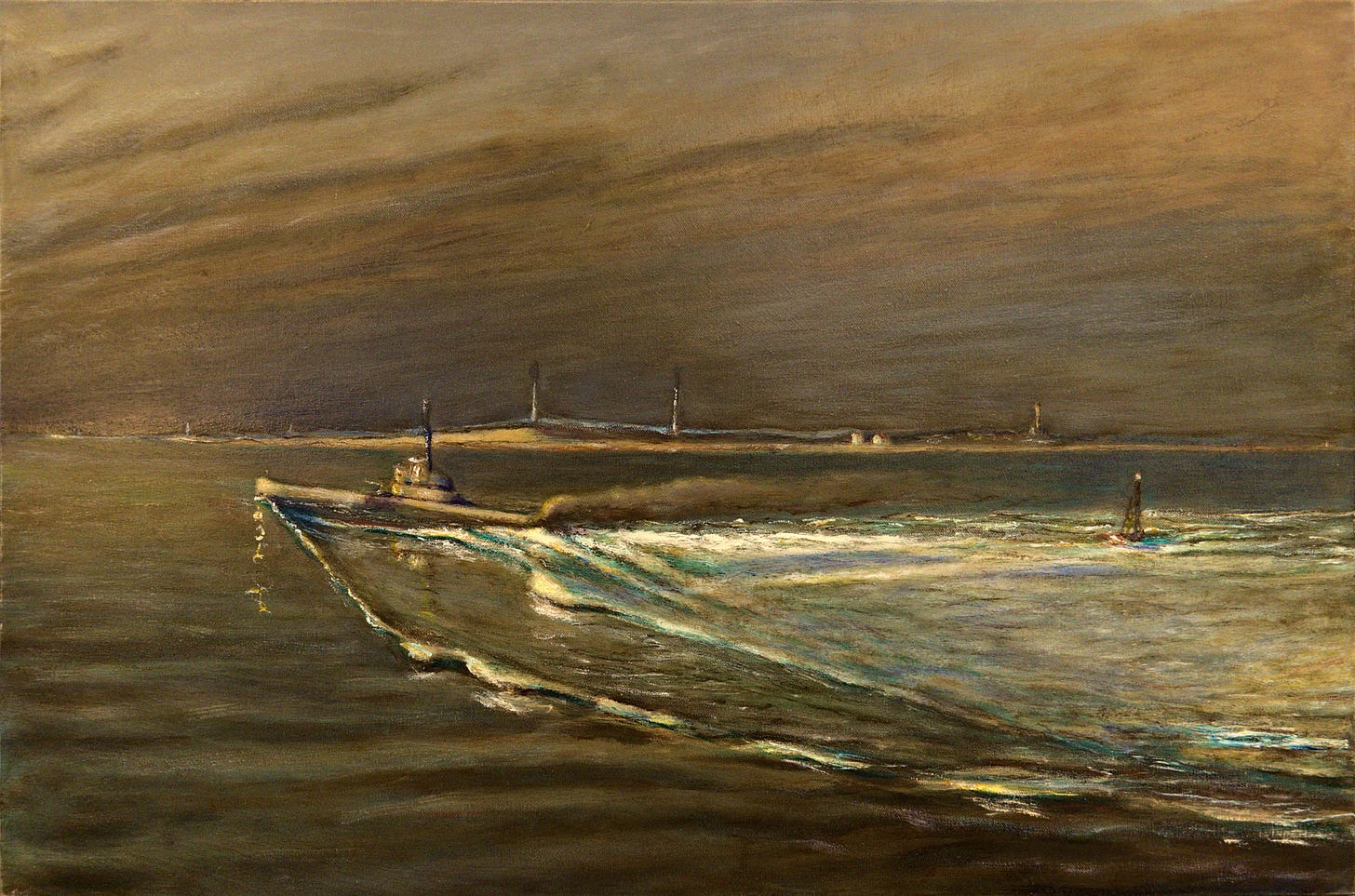Albert dreamt of death. Death on schedule. Death known to be on its way. Death getting closer.
Sometimes in prison. Waiting for the gallows or the guillotine.
Wondering what it was going to be like when it came. The time always drawing nearer.
Sometimes in a fight. Held at gunpoint. Oor in combat. Imagining what a bullet will do to his body. What it will feel like.
Sometimes in illness. Like when his father came home from the hospital to die. Today? Tomorrow?
Walking along the crest of a dune. Not a real dune. It's exaggeratedly tall and straight. It falls away sharply on both sides. The sand always ready to slide away in avalanche. Forging ahead near the crest. Following a strip of beach grass along its top. Holding hands with a friend – not sure who. How long before it all collapses? How long before we’re buried alive?
He never dreamt of drowning.
“A tugboat captain, or a div‘ah,’ will tell ya. Sometimes it don’t take no clairvoyant to know there’s gonna be trouble. Old Hendricks told me one time. Was runnin’ a tug.”
“’Tween when he know-ed the tow was gonna hit and when it happened he had time to make a cup-o-tea. Would’n a done a damn bit o good if the skipp'ah’d yell-t out ord’ahs or just sat down to his tea.”
“Lucky he lived. Just a fluke. Got thrown cle’ah and washed onto some flotsam…”
“Point is. Once the trap is set. It’s gonna happen. No changin’ it. Might be seconds, might be minutes, o’ah ow’ahs. Could be days. Ye’ahs I suppose, sometimes…”
“When they put that air hose on-t’a-the-ballast-tanks an’ not the torpedo room that was one of those times. Took days for ’em to die, but t’was done that minute.”
“O’ah, maybe t’was when they put their faith in ‘little boat, big ocean?’ Maybe that’s when they was as good as dead?”
“O’ah when they give a Destroyer to that galumphin’ bunch-o-wheat fah’mahs? Paradin’ around like floatin’ Keystone Cops!”
Johansen breaks in, “Hey! Hold it! That’s out o’ line.”
“O’ah was it when they decided to make takin’ a little drink agin’ the law?…”
“When they went agin’ the Kaiser? Hell! Blame it on that damn Croatian what killed the Archduke!”
Johansen interrupts again. Turns it into a joke, “Yea, t‘was bloody Eve’s fault! You’ll tell me next!”
“All the same. Don’t take no clairvoyant sometimes to tell it’s gonna go bad. Go real bad. Sometimes….”
S-4 DISASTER!
The Boston Daily Globe, Monday, December 19, 1927: Quoting Ensign George Phanemiller,
“I saw the periscope… thought it was a fish stick, the marker… fishermen use for their nets. I shifted the helm… did not want to get this… stick jammed in our screw. Next I saw a part of the submarine’s conning tower, then the crash came.”
Thought he saw a pole, part of a fish-trap. Adjusted his track to pass to starboard, Leave it to their port side. A fish coming upon an obstruction does the same thing. Turns away from the shore, towards deeper water, towards the safety of the deep.
Makes sense, for a ship as well as a fish. Maybe more so. Coming across a fish-trap’s leader; a string of poles and netting running out perpendicular to the shore; fish instinctively turn seaward and seal their fate, following the “leader” into the “heart” of the trap. This destroyer turned away from the shore. The right thing to do. If it had been a pole. Instead, this change of course sent them directly over the submarine’s most vulnerable point. Ensign Phanemiller “led” the submarine as it traversed their course. This assured they’d strike just forward of its conning tower.
In the time it took for the helmsman to understand what was happening the submarine’s fate was sealed. Had he read it correctly. He would have turned to port. They might have missed the submarine entirely. Or, passed harmlessly over its stern. The part that hung deepest in the water as the bow rose to the surface. It didn’t happen that way. The merely possible became actual in a jarring, grating finality of steel against steel. Death rushed in with the inexorable force of the ocean, always seeking to fill any void.
Submarines live by deception. This one died by it. In combat, that same misidentification of a periscope for a stick might have led to a narrow escape. Or, perhaps, even the sinking of an enemy ship unlucky enough to stray into range.
The collision lifted the bow of the Paulding clear of the water. The submarine rolled over and sank bow first.
Reporter Charles A. Merrill flew from East Boston Airport at 3:10 on the afternoon of the nineteenth on a Boston Airport Corporation plane. Along with photographer Edmund S. Bond they landed at Evan’s Field, the “Old playground of the North Atlantic Fleet” behind Provincetown, at 4:10.
Lt. Comdr. E. E. Ellsburg arrived at midnight. Said it would take two days to rescue the submarine.
Rear Admiral Frank H. Brunby, commander of the rescue force, announced the attachment of an air hose.
An exchange between a diver and men aboard the stricken submarine was passed back and forth, tapping out the words in Morse Code:
Diver, “Is gas bad?”
Answer, “No But the air. How long will you be now?”
Diver, “How many are there?”
Answer, “There are six. Please hurry. Will you be long now?”
Diver, “We are doing everything possible.”
“(Diver Michaels) was hooking up a compartment blow-line. Got badly fouled. Thomas Eady, the first diver to reach the submarine and establish communications ‘volunteered’ to go to his rescue.”
“It was necessary to send diver Eady down to clear him which he did.”
According to Brunby their chances were, “one to 1,000. But my men are willing to offer everything they have to aid their trapped comrades, that is the spirit of the Navy.”
“Aft is a mass of wreckage.” This deterred the divers from checking the status of the crew aft.
Divers emerged from the airlock on Falcon after 80 minutes under water.
“Breached worse than S-51 just forward of the conning tower.” The S-51 sank off Block Island in September of 1925.
Falcon attached an emergency air line to the submarine.
Divers wore leather foul weather gear, coats, pants, boots, knit Balaclava, under their suits.
In a periscope’s glow,
a pair of flickering ovals,
truncated and joined,
lives a bright little world.
A miniature jewel,
glowing in the dark gloom of the conning tower.







